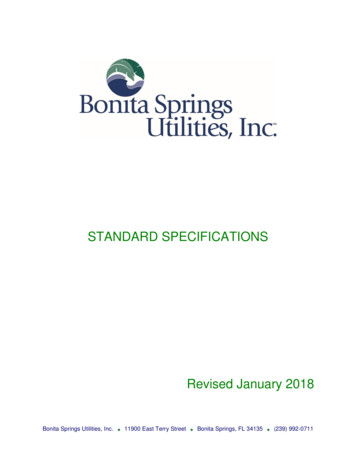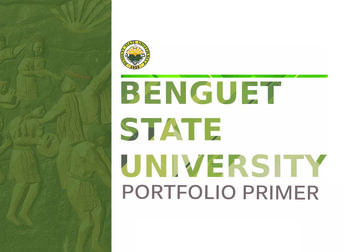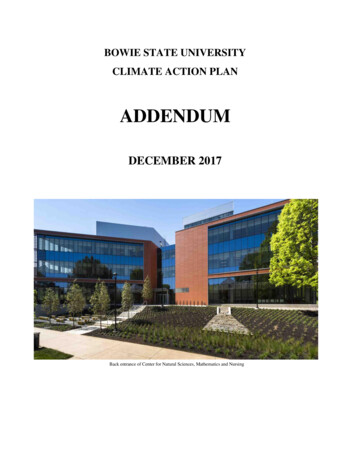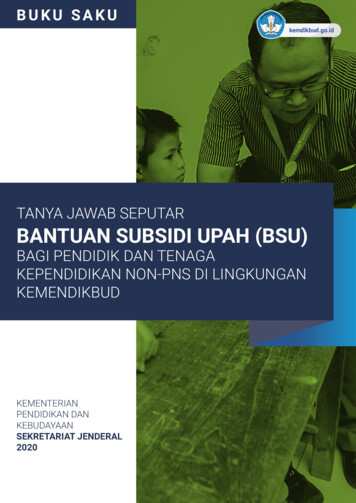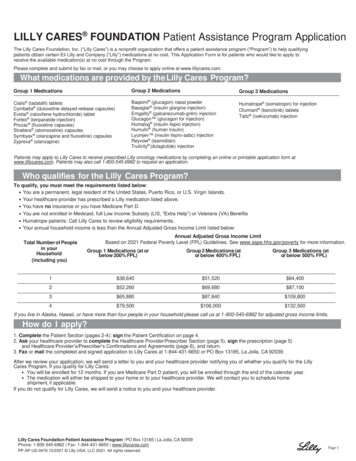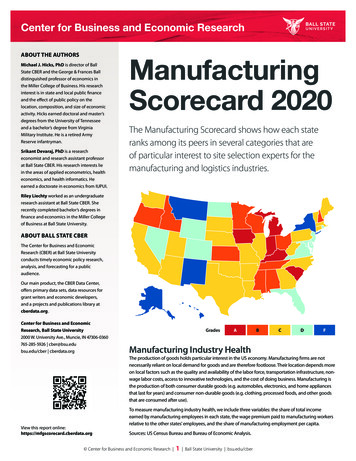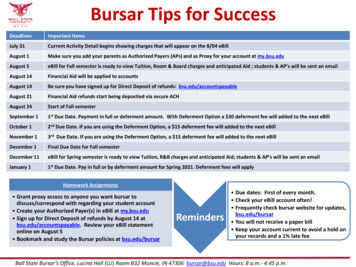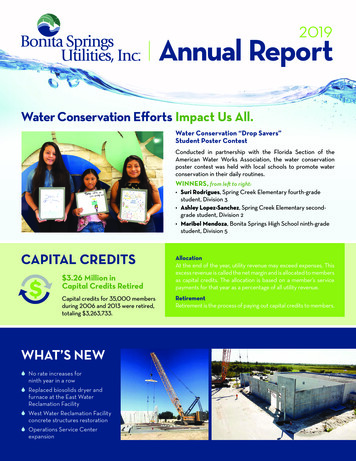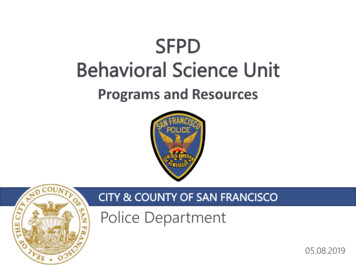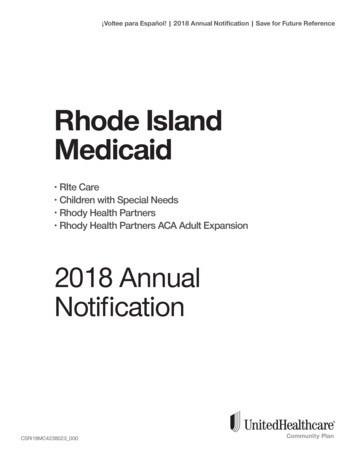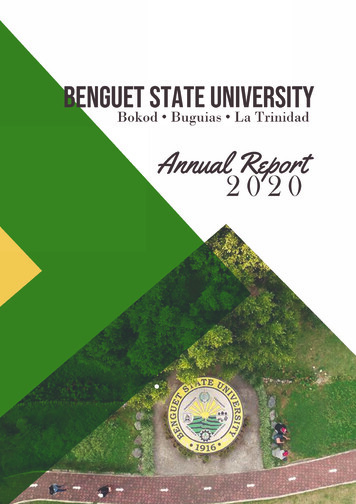
Transcription
BSU CARESChallenge innovationAdvance technology and facilitiesRevitalize administrationEngender partnershipServe to sustain intergenerational roles
Table of ContentsPageTable of ContentsExecutive SummaryINSTRUCTIONCurriculum and InstructionInitiativesDelivery of LearningStudentsEnrolmentStudent AwardsStudent Scholarship and RA 10931 ImplementationStudent DevelopmentGraduatesFacultyFaculty ProfileFaculty and Staff DevelopmentParticipation to Trainings/SeminarsIn-service WebinarsFaculty AwardsInternationalization ActivitiesQS StarsInternational PartnersOther ActivitiesAuxiliary ServicesRegistrar ServicesHealth ServicesLibrary ServicesStudent ServicesCenter for Culture and the ArtsSentro ng Wika at KulturaRESEARCH AND EXTENSIONCompleted ResearchesPublicationsResearch Paper PresentationAwards/RecognitionsUtility Model ApplicationsPublications Registered for Copyright ProtectionWriteshop/Trainings/Seminars and Outreach ActivitiesConducted/Facilitatedpage 1 BSU 2020 Annual 7272829303132323535384041
PageADMINISTRATION AND FINANCEAdministrative Services DivisionHuman Resource Management and DevelopmentProcurement, Supplies and MaintenanceFinance Services DivisionBUSINESS AFFAIRSFood Processing CenterPoultryBakeryGuestelsGarmentsMarketing CenterCanteen 1 (RSDC)Internally Generated IncomeOFFICES UNDER THE OFFICE OF THE UNIVERSITY PRESIDENTInternal Audit ServicesOffice of Quality Assurance and AccreditationPlanning and Development OfficeGender and DevelopmentUniversity Public AffairsOffice of the Board SecretaryUNIVERSITY COVID-19 PANDEMIC 85860BSU 2020 Annual Report page 2
Executive SummaryThe year 2020 was filled with challenges because of the COVID-19 Pandemic. Despitethis, the collective efforts of the University sectors- Academic Affairs, Administration andFinance, Business Affairs, and Research and Extension achieved several accomplishments.All possible adjustments were done by faculty members to reach out to students who weremostly below 21 years old and not allowed to go out of their homes during the variousquarantine periods.Instruction. Fifty-three (53) of the degree programs offered by the Universityare re-accredited by the Accrediting Agency of Chartered Colleges and Universitiesin the Philippines, Inc. (AACCUP) at various levels; while nine (9) degree programswere awarded Certifications of Program Compliance (CoPC) by the Commission onHigher Education (CHED) bringing the total number of programs with CoPC to 32.The University produced 925 graduates during the year: 831 are graduatesfrom BSU La Trinidad, 43 from BSU Bokod, and 51 from BSU Buguias. The University,thru a funding from CHED also received a three-star rating under the QS Stars. Variousinternationalization initiatives and activities were also participated in by the different unitsunder the sector.Research and Extension. A total of 64 research studies were completed, 21research articles were published, 109 research papers were presented, 32 awards werereceived by researchers, and 27 Utlity Model Applications were published by IPOPHL.Another milestone for the Northern Philippine Root Crops Research and TrainingCenter (NPRCRTC) is when it formally received its certificate of accreditation as potatoseed producer on November 11, 2020 from the National Seed Quality Control Servicesof the Bureau of Plant Industry (BPI). This is after complying with the findings andrecommendations of the BPI evaluation team.Meanwhile, the Cordillera Consortium on Agriculture Aquatic Resources Researchand Development (CorCAARRD) placed 2nd runner-up in the UGNAY Awards held virtuallyon December 22, 2020 as part of PCAARRD’s anniversary celebration. The award is grantedby the Philippine Council for Agriculture, Aquatic and Natural Resources Research andDevelopment (PCAARRD) to recognize outstanding performing Consortia nationwide. TheConsortium received a trophy, plaque of recognition, and Php 800,000.00 cash incentivefrom PCAARRD.Administration and Finance. To comply with COVID-19 policies and guidelinesor preventive measures, the sector has implemented separate entry and exit at theAdministration Building as part of the safety and health procedures required within theUniversity. To continue operating, the work plan arrangement of each office has also beenpage 3 BSU 2020 Annual Report
supervised and monitored based on the IATF omnibus guidelines on the implementation ofthe General Community Quarantine (GCQ), and in compliance with Office Memorandum No.65, s. 2020 Guidelines for the COVID-19 for July, 2020 and Office Memorandum No. 79, s.2020 Updated Guidelines for the COVID-19 Modified General Community Quarantine PeriodEffective August 2020. Triage is done on a monthly basis for all employees and those withtransactions within the University.Business Affairs. For the year in review, the COVID-19 pandemic greatly affected themanagement and operations of the UBA. Despite the set-backs by this phenomenon, the IGPsand IGIs still managed to operate. Some projects gained, while some incurred a negative netincome.The OVPBA continued to monitor the operations of the different IGPs and IGIs despitethe COVID-19 Pandemic. Some staff were recommended for work-from-home arrangementwhile the rest reported. Basic operations of the UBA were still in place like the remittance ofdaily income, procurement of office supplies, maintenance of cleanliness, peace and order inleasable properties, and monitoring of parking areas.Majority of the IGPs were back to normal operations in the last quarter of 2020. Aperformance review of the different IGPs was conducted on October 1, 13 and November 19,2020 in preparation for the 2021 Internal Operating Budget (IOB).Office of the President. As for the Offices under the President, these officescontinuously support the operations of the University. The PDO database has been updated,ISO surveillance and AACCUP accreditation visits were efficiently coordinated and conductedvirtually, and the UPAO has been strengthening the presence of the University thru variousplatforms. The OUBS facilitated all meetings of the BOR, Administrative and Academic Councils.This year, the OUBS had also facilitated the selection process for the 7th BSU President.On the other hand, the Legal Office and the Internal Audit Services Office monitorand continuously perform their tasks of ensuring the integrity of the University. The Genderand Development Office has been pioneering programs to uplift the awareness and practiceof gender sensitivity of employees and students.University COVID-19 Initiatives. BSU, in all its capacity initiated donation drives forits students, employees and community members who were stranded because of the varioustravel restrictions due to the COVID-19 Pandemic. Many employees also volunteered theirservices not only within BSU but also in other municipalities or provinces.The University allowed several of its facilities to be used and managed by theLocal Government Unit (LGU) for COVID-19 response. During the period, the University isrepresented in the PIATF and MIATF that make decisions on COVID-19 response.BSU 2020 Annual Report page 4
INSTRUCTIONThe abandoned University premises during theEnhanced Community Quarantine implemented inLa Trinidad on the first quarter of 2020, similar tomany parts of the world.page 5 BSU 2020 Annual ReportThe activities of the University were greatlyaffected by the threat of the COVID-19 Disease. OnMarch 13, 2020, the Provincial Governor declaredthe suspension of classes from 1 PM of March 13until March 22, 2020. With the declaration of aState of Public Health Emergency (ProclamationNo. 922), and the entire Luzon placed underEnhanced Community Quarantine (Memorandumof the Executive Secretary), all activities were gearedtowards ensuring that the University continuedto operate following guidelines and issuancesby the national and local government units.The University is offering a total of 83programs on its three (3) campuses. This numberincludes the three (3) new undergraduate programs:BS Biology, BS Chemistry, and BS Mathematics firstoffered in the SY 2020-2021.Fifty-three (53) of the degree programsoffered by the University are accredited by theAccrediting Agency of Chartered Colleges andUniversities in the Philippines, Inc. (AACCUP) at variouslevels while nine (9) degree programs were awardedCertifications of Program Compliance (CoPC) by theCommission on Higher Education (CHED) bringingthe total number of programs with CoPC to 32.The University, as a result of thesuspensionofface-to-faceclasses,hastransitioned to flexible learning. Various modesof delivery were implemented depending on thecapacity of students and their internet access.There was an increase (13.85%) in thenumber of enrolees during the SY 2020-2021,because of full sections for first year students.However, a decrease of enrollees in the graduateprograms (22.13% in masteral programs and23.79% in doctoral programs) was recorded.The University produced 925 graduatesduring the year: 831 are graduates from BSU LaTrinidad, 43 from BSU Bokod, and 51 from BSU Buguias.The University also received a threestar rating undertheQS Stars. Variousinternationalization initiatives and activities werealso participated in by the different units under thesector.
Curriculum and InstructionThe following is the list of programs offered by the University with their corresponding AACCUPAccreditation and CopC status.COLLEGE OF AGRICULTURE1. Doctor of Philosophy in Agronomy2. Doctor of Philosophy in Rural Development3. Doctor of Philosophy in Horticulture,4. Master of Science in Agribusiness Management,5. Master of Science in Agricultural Economics6. Master of Science in Agronomy7. Master of Science in Animal Science8. Master of Science in Entomology9. Master of Science in Horticulture10. Master of Science in Plant Pathology11. Master of Science in Rural Development12. Master of Science in Soil Science13. Bachelor of Science in Agriculture14. Bachelor of Science in Agribusiness15. Bachelor of Science in Development CommunicationCOLLEGE OF ARTS AND SCIENCES16. Doctor of Philosophy in Language – English Language17. Doctor of Philosophy in Language – Filipino Language18. Doctor of Philosophy in Science Education – Biology19. Master of Science in Biology20. Master of Science in Environmental Science21. Master of Arts in Applied Statistics22. Master of Arts in General Science23. Master of Arts in Chemistry24. Master of Arts in English as a Second Language25. Master of Arts in Filipino26. Master of Arts in Mathematics27. Master of Arts in Physics28. Master of Arts in Social Studies29. Bachelor of Science in Biology30. Bachelor of Science in Chemistry31. Bachelor of Science in Environmental Science32. Bachelor of Science in Mathematics33. Bachelor of Science in Statistics(formerly BS Applied Statistics)34. Bachelor of Arts in Communication35. Bachelor of Arts in English Language36. Bachelor of Arts in Filipino LanguageLEVEL IIILEVEL IIILEVEL IIILEVEL IILEVEL IIILEVEL IIILEVEL IVLEVEL IIILEVEL IIILEVEL IIILEVEL IIILEVEL IIILEVEL III, with CoPCLEVEL III, with CoPCLEVEL III, with CoPCLEVEL IILEVEL IILEVEL IILEVEL II, with CoPCwith CoPCLEVEL IILEVEL IILEVEL IILEVEL II, with CoPCLEVEL II, with CoPCLEVEL II, with CoPCLEVEL IILEVEL IIwith CoPCwith CoPCLEVEL II, with CoPCwith CoPCLEVEL III, with CoPCwith CoPCwith CoPCwith CoPCCOLLEGE OF ENGINEERING AND APPLIED TECHNOLOGY37. Bachelor of Science in AgriculturalLEVEL III, with CoPCand Biosystems Engineering (formerly BS Agricultural Engineering)COLLEGE OF FORESTRY38. Master of Science in Forestry39. Bachelor of Science in ForestryLEVEL II, with CoPCLEVEL III, with CoPCCOLLEGE OF HOME ECONOMICS AND TECHNOLOGY40. Master of Arts in Home Economics41. Master of Arts in Technology and Home Economics42. Bachelor of Science in Nutrition and Dietetics43. Bachelor of Science in Home Economics44. Bachelor of Science in Hospitality Management(formerly BS Hotel and Restaurant Management)45. Bachelor of Science in Entrepreneurship(formerly BS Entrepreneurial Technology)LEVEL IILEVEL IILEVEL III, with CoPCLEVEL IIILEVEL I, with CoPCLEVEL II, with CoPCBSU 2020 Annual Report page 6
COLLEGE OF NURSINGBachelor of Science in NursingLEVEL IV, with CoPCCOLLEGE OF TEACHER EDUCATIONDoctor of Philosophy in Education ManagementMaster of Arts in EducationLEVEL IIMaster of Arts in GuidanceLEVEL IIMaster in Library and Information ScienceLEVEL I, with CoPCBachelor in Early Childhood Education (from BEE Major in Early Childhood Development)Bachelor in Physical EducationBachelor in Elementary EducationLEVEL IV, with CoPCBachelor in Library and Information ScienceLEVEL II, with CoPCBachelor in Secondary EducationLEVEL IV, with CoPCBachelor in Technology and Livelihood Education(from BSE major in TLE and BS Home Economics)COLLEGE OF VETERINARY MEDICINEDoctor of Veterinary MedicineLEVEL III, with CoPCINSTITUTE OF HUMAN KINETICSMaster of Science in Physical EducationLEVEL IIBachelor of Science in Exercise and Sports Sciencewith CoPCPhysical Education (from BPE major in Sports and Wellness Management)Diploma in Physical EducationINSTITUTE OF INFORMATION TECHNOLOGYBachelor of Science in Information TechnologyINSTITUTE OF PUBLIC ADMINISTRATIONMaster of Science in Public AdministrationBachelor in Public AdministrationDiploma in Public AdministrationCertificate in Public AdministrationLEVEL II, with CoPCLEVEL IIwith CoPCOPEN UNIVERSITYMaster in Community DevelopmentMaster in Community Health DevelopmentMaster in Development CommunicationMaster in Cooperative ManagementMaster in Human Resource ManagementMaster in Urban ManagementMaster in Non-Formal EducationDiploma in Training ManagementDiploma in Urban ManagementCertificate in Organic AgricultureCertificate in Community Health DevelopmentBOKOD CAMPUSBachelor of Elementary EducationBachelor of Technology and Livelihood EducationBachelor of Technical-Vocational Teacher Education(formerly BS Industrial Education)Bachelor of Science in Industrial TechnologyLEVEL ILEVEL IBUGUIAS CAMPUSBachelor of Agricultural TechnologyBachelor in Elementary EducationBachelor of Physical EducationBachelor in Secondary EducationBachelor of Technical-Vocational Teacher Education(formerly B in Technology Teacher Education)page 7 BSU 2020 Annual ReportLEVEL ILEVEL I
The call for a transition to flexible learning as a result of the suspension of face-to-face classes wasa challenge to the University especially to the faculty members and the students. Despite the challenge, theUniversity was able to quickly adapt to flexible learning. Various delivery of learning modes were implementeddepending on the capacity of students and their internet access.I. Initiatives.The first initiatives were to issue advisories guiding students and employees followed bythe development of a training/capability program for all faculty members in the University. Table 1 shows thedetailed list of activities done in coping up with the effects of the COVID-19 Pandemic.Table 1. Activities done in coping up with the effects of the COVID-19 PandemicA. ADVISORIES, OFFICE MEMORANDA, AND SURVEY ISSUED TO COLLEGE DEANS, INSTITUTEDIRECTORS, CAMPUS DEANS AND FACULTY MEMBERSAdvisories issued on April 1, 8 and 23; and Office Memorandum No. 52 series of 2020 issuedon April 13, 2020 directed faculty members to learn, familiarize and develop skills on online ore-learning platforms as part of their work from home arrangements.Office Memorandum No. 59 series of 2020 issued on May 14, 2020 directed faculty members tolearn, familiarize and develop skills on flexible or blended learning and for the deans, institutedirectors, campus deans and department chairs to search for reading materials or modules onflexible learning for their faculty members.Office Memorandum No. 62 series of 2020 issued on May 20, 2020 directed faculty members toconduct their classes for the midyear term using the flexible learning system or mode and advisingthem to establish a clear communication plan with their students using non-face to face meanssuch as social media platforms, electronic mail, and courier services.Office Memorandum No. 78 series of 2020 issued on July 30, 2020 directed faculty members toadopt flexible learning as the learning delivery mode on August 2020.Office Memorandum No. 90 series of 2020 issued on September 11, 2020 directed faculty membersto adopt flexible learning as the learning delivery mode from September to December 2020.A Google Survey was conducted to Assess General Level of Skills of Teachers in the Usage of ICTs andBlended Learning Experiences of Teachers. As of May 2020, results showed that 54.8% of teachershave good skills in the usage of ICTs; 32.6% fair; 8.4% excellent; and 4.2% have low capability while35.1% are with blended learning experience and 64.9% have no experience.Office Order No. 47, series 2020 constituted the Ad Hoc Committee led by VP for Academic AffairsKenneth A. Laruan, and CTE Dean Imelda G. Parcasio as the vice-chair with the following members:UPAO Director Kara S. Panolong, GS and OU Director Romeo A. Gomez, OQAA Director Aurea MarieM. Sandoval, CAS Dean Samuel S. Poliden, ILC Director Ronda B. Tullay, IIT Director Frevy T. Orencia,OSS Director Russell B. Dolendo, CTE-DEE Chair Divina M. Yango, CA Faculty Member Igrelyn B.Pinos-an, CTE Faculty Member Janet Lynn M. Balagtey, CTE Faculty Member Jean Jeannette D.Sibayan, ICT Division OIC Oliver Tabdi, and HRMO Chief Raymundo H. Pawid Jr.B. CONDUCTED SERIES OF WEBINAR/ SEMINAR ON FLEXIBLE LEARNING/BLENDED LEARNINGOn May 29 and June 2, 2020, a capability building for the Ad Hoc Committee on Flexible Learningor Blended Learning was held with resource speakers from outside of BSU.On June 5-8, 2020, the capability building for Batch 1 (college deans, institute directors, college orinstitute secretaries, department chairs and faculty members handling courses offered during themid-year term) was held.On June 16-18, 2020, Batch 2, 3, and 4 (faculty members who are designated in other sectors andall faculty members who are on teacher’s leave) had their capability building. The topics coveredinclude: Introduction to Blended Learning, Introduction to Flipped Classroom, Introducing LearningManagement Systems and Educational Tools, Facilitating Classes in a Learning ManagementSystem: Google Classroom, Developing a Module and Learning Packet for a Blended Learning Classor Remote Learning, Assessment in Blended Learning, Finding Appropriate Learning Resources,Creating Self Made Videos for Instruction, and Uploading power point presentations.All presentations were video recorded and videos were sent to all colleges, institutes, and campusesfor viewing or review of the topics presented.BSU 2020 Annual Report page 8
C. CREATION OF VIDEOS TO GUIDE FACULTY MEMBERS FACILITATE CLASSES USING GOOGLECLASSROOM AND OTHER APPLICATIONSThe following videos were created and disseminated on August 03-07, 2020 to all colleges,institutes, and campuses: Making Quality Video for Instruction 1, Making Quality Video forInstruction 2, Downloading, Installing, Recording with Bandicam, Bandicut Downloading InstallingTrimming Joining Videos, Video Compress with Handbrake, Power point Presentation, Basic FileManagement and E- Class Record Template.D. MODULE WRITING WORKSHOP (PER COLLEGE/INSTITUTE/CAMPUS)Module writing workshops were conducted on July 28 to August 11, 2020 facilitated by UIMDCand CTE. Copies of the IM Policy 2020 Final Version and Instructional Model were disseminated toall colleges, institutes, and campuses on July 27-30, 2020.E. IN-SERVICE TRAINING FOR FACULTY MEMBERS CONDUCTED BY THE HUMAN RESOURCESDEVELOPMENT OFFICEA Short Session Training and Review for Teachers (START) using Google Classroom (Tutorial sessionfor faculty members on the use of Google classroom) was conducted on August 10-13, 2020.F. USE OF THE ICT HALL AND ULIS FACILITIES AND EQUIPMENT FOR WEBINARS AND AS HUB FORFACULTY MEMBERS FOR THEIR GOOGLE CLASSROOM CLASSESThe Information and Communication Technology Division (ICT Division) and University Library andInformation Services (ULIS) posted schedules for faculty members who intends to use their facilityand equipment in conducting their Google Classroom Classes.G. UPGRADING OF THE INTERNET CONNECTION OF THE UNIVERSITYThe University Internet connection was upgraded from 30Mbps (leased line - Globe INNOVE) to200Mbps (leased line - PLDT) for faculty and staff use and from 50Mbps (leased line - PLDT) to100Mbps (leased line - CONVERGE) for students use.H. PROCUREMENT OF CELL PHONE CARDS FOR FACULTYPhotos during the in-service trainings on flexible learningpage 9 BSU 2020 Annual Report
II. Delivery of Learning.All possible adjustments were done by faculty members to reach out tostudents who were mostly below 21 years old and not allowed to go out of their homes during the variousquarantine periods.A. NUMBER OF COURSESThere was a total of 2,541 courses orsubjects offered in the University during thesemester. This number includes courses inall levels (baccalaureate, post-baccalaureate,masteral, and doctorate) but excludes thesis,internship, practicum, and practice teaching.At the baccalaureate level, 8,121 courseswere offered during the semester. Again, thisnumber excludes thesis, internship, practicum,and practice teaching. The highest percentage(24.51%) is offered by the College of Arts andSciences (CAS) as they are handling GeneralEducation courses. The distribution of coursesby academic unit is presented in Figure 1.Figure 1. Distribution of courses by academic unitB. MODULE PREPARATIONAfter the In-service Trainings (INSET), facultymembers prepared modules and compiled learningpackets that were distributed periodically. Learningpackets are the units or chapters of a module or thechunks of a chapter of the whole module. They comein packets where students can learn independently attheir own pace for a particular lesson or a skill.C. MODE OF DISTRIBUTIONLearning materials were distributed mostly(97.29%) as learning packets. This was practicedsince module preparation was ongoing or was beingdone per chapter or chunks of a chapter and alsoto keep up with the learning pace of the students,especially because of their Internet connection andtransportation limitations. The assistance of LocalGovernment Units (LGUs) in the distribution ofmodules were sought.D. PLATFORM FOR DISTRIBUTIONFaculty members of the University utilizedvarious platforms to distribute modules or learningpackets to students. These platforms were: LearningManagement Systems including Google Classroom,Blackboard and, Edmodo; Email or Google Drive;Social Media (Facebook Group Page, FacebookGroup Chat or Private Message, YouTube); PrintedCopy Picked-up at the University or Sent as writtenBSU 2020 Annual Report page 10
GoogleEdmodotopage 11
Figure 3. Platform combinations utilized for the distribution of learning packetsBSU 2020 Annual Report page 12
StudentsI. Enrollment.The detailed number of enrollees per program is shown in Table 2. The 7,514 studentsthat enrolled during the 2nd semester, SY 2019-2020 was 7.09% lower than the number of enrollees during theprevious semester (1st semester, SY 2019-2020 with 8,087 enrollees). Most of the students (20%) enrolled at theCollege of Teacher Education (CTE) while 19% enrolled at the College of Agriculture (CA), 16% enrolled at theGraduate School (GS), and 7% enrolled at the College of Home Economics and Technology (CHET).For the Mid-year Term, a total of 287 students enrolled. Majority of those who enrolled are graduatingstudents who had to finish their thesis or dissertation. Most (27%) are GS enrollees, 25% are CA enrollees, and23% are Open University (OU) enrollees.For the 1st Semester SY 2020-2021, there were a total of 8,555 enrollees, which was 13.85% higherthan the previous semester. Just like the previous terms, most (21%) of the students enrolled at the CTE, 18%enrolled at the CA, 11% enrolled at the GS, 7% enrolled at the CAS and 7% enrolled at the CHET.It was observed, however, that there was a decrease of enrollees in the graduate programs with 22.13%of the students enrolling in masteral programs and 23.79% in doctoral programs.Table 2. Distribution of students by academic level and unitDEGREE PROGRAMLa Trinidad CampusBACCALAUREATECOLLEGE OF AGRICULTURE (CA)Bachelor of Science in Agriculture (BSA)Bachelor of Science in Agribusiness (BSAB)Bachelor of Science in Development Communication (BSDC)Cross EnrolleeSubtotalCOLLEGE OF ARTS AND SCIENCES (CAS)Bachelor of Arts in Communication (BA Comm)Bachelor of Arts in English Language (BAEL)Bachelor of Arts in Filipino Language (BAFL)Bachelor of Science in BiologyBachelor of Science in ChemistryBachelor of Science in MathematicsBachelor of Science in Statistics (BSS)Bachelor of Science in Environmental Science (BSES)Cross EnrolleeSubtotalCOLLEGE OF ENGINEERING AND APPLIED TECHNOLOGY (CEAT)Bachelor of Science in Agricultural and Biosystems Engineering(BSABE)Cross EnrolleeSubtotalCOLLEGE OF FORESTRY (CF)Bachelor of Science in Forestry (BSF)Subtotalpage 13 BSU 2020 Annual Report2ND SEM2019-2020MIDYEAR20201ST 39984978573911431
DEGREE PROGRAMCOLLEGE OF HOME ECONOMICS AND TECHNOLOGY (CHET)Bachelor of Science in Home Economics (BSHE)Bachelor of Science in Hospitality Management (BSHM)Bachelor of Science in Nutrition and Dietetics (BSND)Bachelor of Science in Entrepreneurship (BS Entrep)SubtotalCOLLEGE OF NURSING (CN)Bachelor of Science in Nursing (BSN)SubtotalCOLLEGE OF TEACHER EDUCATION (CTE)Bachelor of Early Childhood Education (BECEd)Bachelor of Elementary Education (BEEd)Bachelor of Library and Information Science (BLIS)Bachelor of Physical Education (BPEd)Bachelor of Secondary Education (BSEd)Bachelor of Technology and Livelihood Education (BTLEd)Cross EnrolleeProfessional EducationSubtotalSubtotal (with prof ed)COLLEGE OF VETERINARY MEDICINE (CVM)Doctor of Veterinary Medicine (DVM)SubtotalINSTITUTE OF HUMAN KINETICS (IHK)Bachelor of Physical Education (BPE)Bachelor of Science in Exercise and Sports Sciences (BSESS)Cross EnrolleeSubtotalINSTITUTE OF INFORMATION TECHNOLOGY (IIT)Bachelor of Science in Information Technology (BSIT)SubtotalINSTITUTE OF PUBLIC ADMINISTRATION (IPA)Bachelor in Public Administration (BPA)SubtotalOTHERSROTC Cross EnrolleeSubtotalTotalTotal (with prof ed)POST BACCALAUREATEGRADUATE SCHOOL (GS)2ND 14281525407407MIDYEAR20201ST 32332222221124524511550856050143143067726831BSU 2020 Annual Report page 14
DEGREE PROGRAM2ND SEM2019-2020MIDYEAR20201ST SEM2020-20214541322611118Diploma in Physical Education (DPE)Diploma in Public Administration (DPA)Certificate in Public Administration (CPAd)SubtotalOPEN UNIVERSITY (OU)SubtotalTotal (GS OU)MASTERSGRADUATE SCHOOL (GS)M Library and Information Science (MLIS)M Public Administration (MPA)MA Applied Statistics (MA AS)MA Chemistry (MA Chem)MA Education (MA Ed)MA English as a Second Language (MA ESL)MA Filipino (MA Fil)MA General Science (MA Gsci)MA Guidance (MA G)MA Home Economics (MAHE)MA Mathematics (MA Math)MA Physics (MA Phys)MA Social Studies (MA SS)MA Technology and Home Economics (MATHE)MS Agribusiness Management (formerly MRSM)MS Agricultural Economics (MS Ag Econ)MS Agronomy (MS Agro)MS Animal Science (MS AnSci)MS Biology (MS Bio)MS Entomology (MS Entom)MS Environmental Science (MSES)MS Forestry (MSF)MS Horticulture (MS Horti)MS Physical Education (MSPE)MS Plant Pathology (MS PP)MS Rural Development (MS RD)MS Soil Science 4327359582412318121913425846161916737OPEN UNIVERSITY (OU)M Human Resource Management (MHRM)M Community Development (MCD)M Development Communication (MDC)M Urban Management (MUM)89554824202011574434417page 15 BSU 2020 Annual Report5721121712122
DEGREE PROGRAMM Non-Formal Education (MNFE)M Community Health Development (MCHD)M Cooperative Management (MCM)SubtotalTotal (GS OU)DOCTORALGRADUATE SCHOOLPhD Agronomy (PhD Agro)PhD Educational Management (PhDEM)PhD Horticulture (PhD Horti)PhD Language Education (PhDLE)PhD Language - English LanguagePhD Language - Filipino LanguagePhD Rural Development (PhDRD)PhD Science Education - Biology (PhDSE)TotalGRAND TOTALGRAND TOTAL (with prof ed)2ND SEM2019-2020MIDYEAR20201ST 4799304536870195Bokod CampusBACCALAUREATEBachelor of Elementary Education (BEE)Bachelor of Technology and Livelihood Education (BTLEd)Bachelor of Technical-Vocational Teacher Education (BTVTEd)Bachelor of Science in Industrial Technology (BSIT)GRAND TOTAL13255855151Buguias CampusBACCALAUREATEBachelor of Agricultural Technology (BAT)Bachelor of Technical-Vocational Teacher Education (BTVTEd)Bachelor of Elementary EducationBachelor of Physical EducationBachelor of Secondary EducationProf Education UnitsGRAND TOTAL (with Prof Ed)2710444316527103612738519520367GRAND TOTAL (ALL CAMPUSES)75142878555BSU 2020 Annual Report page 16
ndGHANACHINASOUTH KOREAYi Bo HeNIGERIALIBYAMYANMARII. Student AwardsIII. Student Scholarship and RA10931 Implementationndththndthth1IV. Student Development
V. GraduatesThe University produced 925 graduates for the School Year 2019-2020. There are 144 graduates forthe 1st Semester, 667 graduates for the 2nd Semester, and 114 for the Mid-year Term. About 90% (831) aregraduates from BSU La Trinidad while BSU Bokod and BSU Buguias produced 43 and 51 graduates, respectively.The distribution of the graduates by academic level, unit and program
BSU, in all its capacity initiated donation drives for its students, employees and community members who were stranded because of the various travel restrictions due to the COVID-19 Pandemic. Many employees also volunteered their services not only within BSU but also in other municipalities or provinces.
